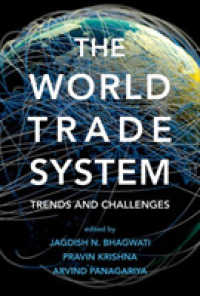- ホーム
- > 洋書
- > 英文書
- > History / World
Full Description
In 1917, Bolshevik revolutionaries overthrew the tsar of Russia and established a new, communist government, one that viewed the Imperial Russia of old as a righteously vanquished enemy. And yet, as Pavel Khazanov shows, after the collapse of Stalinism, a reconfiguration of Imperial Russia slowly began to emerge, recalling the culture of tsarist Russia not as a disgrace but as a glory, a past to not only remember but to recover, and to deploy against what to many seemed like a discredited socialist project.
Khazanov's careful untangling of this discourse in the late Soviet period reveals a process that involved figures of all political stripes, from staunch conservatives to avowed intelligentsia liberals. Further, Khazanov shows that this process occurred not outside of or in opposition to Soviet guidance and censorship, but in mainstream Soviet culture that commanded wide audiences, especially among the Soviet middle class. Excavating the cultural logic of this newly foundational, mythic memory of a "lost Russia," Khazanov reveals why, despite the apparently liberal achievement of the collapse of the Soviet Union in 1991, Boris Yeltsin (and later, Vladamir Putin) successfully steered Russia into oligarchy and increasing autocracy. The anti-Soviet memory of the pre-Soviet past, ironically constructed during the late socialist period, became and remains a politically salient narrative, a point of consensus that surprisingly attracts both contemporary regime loyalists and their would-be liberal opposition.
Contents
List of Illustrations
Acknowledgments
Note on Transliteration and Translation
Introduction
Chapter 1. Soviet Children, in Search of Imperial Grandparents: The Liberal Intelligentsia Subject and Its Historical Occlusions
Chapter 2. History Doesn't Bear a Grudge: The Rightist Variation on the Neo-Imperial Intelligentsia Subject
Chapter 3. Dare You Come to the Square? Soviet Humanism and Neo-Decembrist Protest for the ITR Class
Chapter 4. The Intelligent Shall Become Narodnyi: The Rightist Variation on Soviet Humanism
Chapter 5. The Post-Soviet Stolypinist Project
Chapter 6. A Russia That They Have Lost? Anxiety and Immanent Critique of the Fascinated Stolypinist Subject
Afterword
Notes
Bibliography
Index








